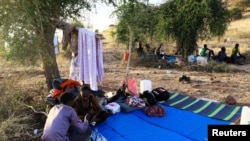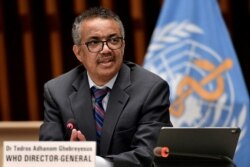The United Nations says up to 200,000 refugees could cross into Sudan from Ethiopia in the next six to 12 months, fleeing conflict in the northern Ethiopian region of Tigray.
The U.N. said 1,896 refugees crossed the border Wednesday, with a total of 33,000 since the conflict erupted two weeks ago.
Among the refugees are Guesh Weldemhret, his wife and two young children, who were forced by heavy shelling to flee their home in the western Tigray community of Humera.
“People were running for their lives,” the day laborer told VOA in a phone call Wednesday from a newly opened refugee center near the Sudanese city of Hamdai.
Some didn't make it
Some of his neighbors did not escape, said Guesh, who added that he recognized the bodies of a new bride and an older woman amid rubble in Humera.
Guesh and his family arrived at the camp about a week ago with nothing more than the clothes they were wearing. But Guesh is focused on “helping people in distress,” many of whom are frail elderly, or women who are pregnant or are with young children, he said. Some Tigrayans who live in Khartoum and Kessela are sending aid, including donations of clothing and food, “and I am volunteering to coordinate any help we can get,” he added.
“Refugees are hungry. They have nothing to eat,” Guesh continued. “They left all their properties behind. Banks in Tigray were closed. They had no money in their hands. Poor or wealthy, they are here in the same desperate situation: hungry and helpless.”
Many of the people are sick and need medical treatment, he said. “The world must see us and help us.”
According to the U.N., there are many young men among those seeking refuge because they feared they’d be forced to fight if they remained.
Some of the refugees say they walked for several days through the bush, and the U.N. said many were exhausted and hungry, with some in need of medical attention.
Millions of children
Children in Tigray also are at high risk.
“Inside the Tigray region, restricted access and the ongoing communication blackout have left an estimated 2.3 million children in need of humanitarian assistance and out of reach,” UNICEF said in a Thursday statement.
“My heart breaks for my home, Ethiopia, and I call for all parties to work for peace to ensure the safety of civilians and access for health and humanitarian assistance to those in need,” said World Health Organization (WHO) chief Tedros Adhanom Ghebreyesus in a tweet Thursday.
Conditions in Tigray have deteriorated since the Ethiopian government launched a military offensive two weeks ago. The government said this was in response to an alleged attack by the Tigray People’s Liberation Front on a government defense post.
UNHCR spokesman Babar Baloch said a full-scale humanitarian crisis is unfolding in the region. One established fact, he said, is that every war creates refugees.
“We have seen that repeatedly that civilians are affected as soon as conflict starts. So, people are really worried. They are fleeing," Baloch said. "There are stories of family separation, people not coming with anything. So that is why we are ramping up our assistance to help them."
Ethiopia predicted Wednesday it would soon defeat the Tigray People's Liberation Front in the country’s northern region, while the TPLF maintained it had secured military victories in a two-week war that threatened to further destabilize the Horn of Africa.
Army chief Berhanu Jula said Ethiopian forces were approaching Tigray’s capital of Mekelle and “winning on all fronts.”
But Tigrayan leader Debretsion Gebremichael said his forces were “inflicting heavy defeats on all fronts against the forces that came to attack us” and have turned Tigray into “a hell to its enemies.”
The war has killed hundreds of people and tested the ability of Prime Minister Abiy Ahmed, Africa’s youngest leader at age 44, to maintain unity among the country’s fractious ethnic groups.
Calls to end the violence have escalated since civilians caught up in the conflict fled to Sudan. The U.N. warned Tuesday that a “humanitarian disaster is unfolding.”
Abiy initiated a military campaign against the Tigray region on November 4 after accusing the TPLF of attacking federal troops in the area.
Federal forces have since escalated the offensive, leading to more intense fighting in the region.
Gebre Gebremedhin of VOA’s Horn of Africa Service contributed to this report.







